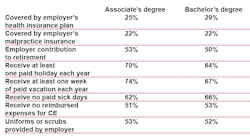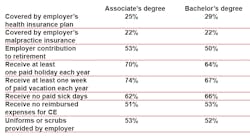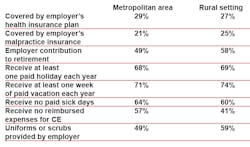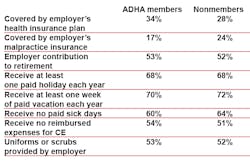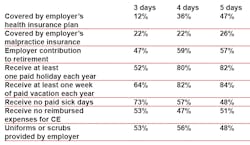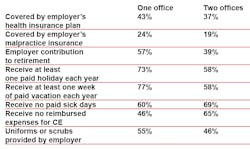In the grand finale of the 2013 job benefits survey, the conventional wisdom states that the more days you work and the fewer offices in which you work are compelling factors on the quality of you benefits earn.
Or, is that “duh” wisdom?
The final demographic breakdowns of the statistics examined degree completion (no significant difference), urban vs. rural settings (no significant difference), and ADHA membership (slight differences).
If benefits are lacking, what every dental hygienist needs is a full-time job in a single office.
According to salary surveys, those opportunities are hard to come by. Those statistics suggest a belief among hygienists that employers prefer multiple part-time hygienists to avoid having to offer benefits to the employees earning the highest wages.
The first three parts of the salary survey can be found at:
2013 Dental Hygienist Job Benefits Survey — Part 3
Job benefits for dental hygienists: Part 2
Survey: Dental hygienists scramble for health insurance
In the comparisons below, the numerals cited in the headings refer to the total number of responses in a demographic category. Overall, 2,068 dental hygienists participated in the survey.
Associate’s degree (1,256) vs. bachelor’s degree (690)
There was very little difference in hygienists who earned an associate’s degree vs. those who earned a bachelor’s degree:
Metropolitan (1,358 respondents) vs. rural (717)
Does it make any difference to practice in the city or in a small town? Overall, it does not, but take a look at the edge that rural hygienists have in employer contributions to a retirement plan — almost a 10% edge.
Perhaps not as significantly, a career in a rural setting makes it more likely that you will receive at least some reimbursement from an employer for expenses related to continuing education — by almost 16 percentage points. In addition, rural employers are more likely to provide uniforms — by 10%.
b>ADHA member (574) vs. nonmembers (1,527)
Generally speaking, salary surveys support an assertion that ADHA members will earn at least slightly more income than nonmembers. There appears to be a slight edge in many accrued job benefits too. The exception — a 7% differential in malpractice insurance — can be explained by pointing out that ADHA members have access to professional liability insurance through their membership. Dental hygiene consultants often advocate that a hygienist should have her own legal representation in a dispute, rather than the employer’s attorney.
Working three days a week (509) vs. four days (956) vs. five days (331)
The more you work, the more benefits you earn. Yes, we know; many hygienists would love to work more hours to qualify for benefits.
But what’s the deal with part-timers being more likely to have an employer provide a uniform? Does the increased wealth of $200 to $400 a week mean the rich hygienists should just buy their own uniforms?
Working in one office (1,532) or two offices (419)
In the same vein as the preceding demographic breakdown, dental hygienists were asked in how many offices they are currently employed. Many hygienists say they have to hold more than one job to make ends meet.
The survey also asked if they worked in three, four, or five or more offices. But the responses were few in number, so the statistics compare employment in one office vs. two offices.
Hygienists often comment on the desirability of employment with one employer, and the greater availability of benefits as a good reason why. If you’re a full-time hygienist trying to capitalize on benefits through multiple jobs, it can be tough.
About the Author

Mark Hartley
Mark Hartley is the editor of RDH magazine and collaborates with Kristine Hodsdon on many of the articles for RDH eVillage, which also appear on DentistryIQ.com.
